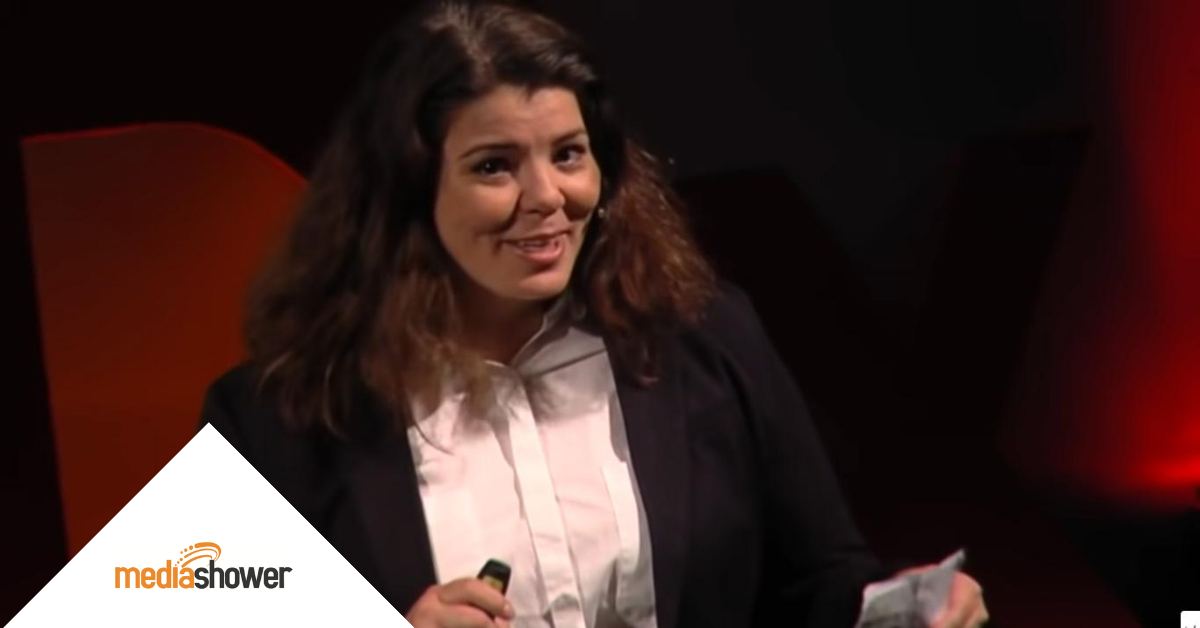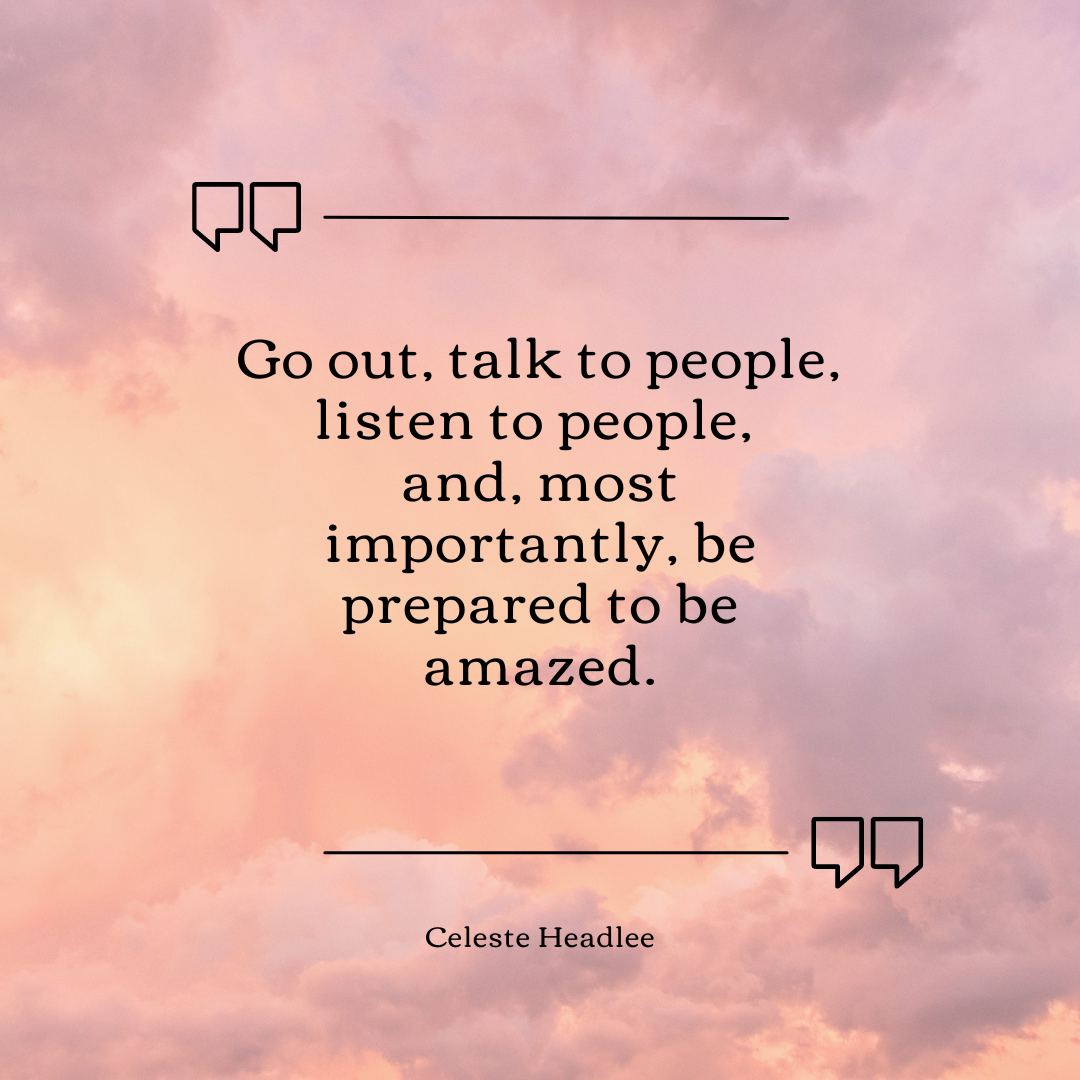
TLDR: In her TED speech viewed by over 30 million people, professional interviewer Celeste Headlee rings an alarm bell about our declining conversation skills. We all like to speak more than we listen, she says. Then, she delivers a handful of tips to help us learn how to have better conversations. According to her, active listening and genuine curiosity are the cornerstones of communication.
So what?: Being able to communicate effectively is an essential life and leadership skill. Conversations can teach surprising things while creating opportunities. Among other benefits, they help us build and maintain relationships, and they support our mental health.
“A conversation requires a balance between talking and listening, and, somewhere along the way, we lost that balance.”
Celeste Headlee thinks our face-to-face interactions can become moments of genuine, mutually beneficial connection.
Many of us like to talk, but find it hard to listen. We are bad conversationalists, less and less likely to compromise in an ever more polarized world. Our smart devices hurt our communication skills, and good conversations are rapidly becoming a lost art.
Celeste Headlee has some actionable rules you can use to boost your conversational skills. In this post, we unpack her advice and break down her tips to help you get more out of your interactions.
Here are some of her best practices for meaningful conversations.
Be Present
“There is no reason to learn how to show you’re paying attention, if you are, in fact, paying attention.”
Takeaway: Give your conversation partner your undivided attention.
According to Celeste Headlee, the most basic rule of a meaningful conversation is to be fully present in it.
- Don’t fidget with your car keys or phone.
- Do not let your mind wander.
- Don’t worry about crafting a reply to your conversational partner.
Just listen. Active listening creates an environment conducive to full engagement and genuine dialog. It also requires you to put your ego and opinions aside.
If you want to leave the conversation, feel free to do so, Celeste recommends. Just don’t pretend to pay attention unless you actually are.
Keep an Open Mind
“Everyone you will ever meet knows something you don’t.” – Bill Nye
Takeaway: Treat conversations as learning opportunities.
We like to foist our ideas, beliefs, and misplaced sense of self-importance on others. We love to feel smart. We enjoy pontification. To do so, we approach conversations with a confirmation bias, unwilling to open up to fresh ideas and perspectives.
Don’t try to convince others of your truth. Learn how to listen effectively in conversations and derive lessons from what you hear. Other people know things you don’t. To learn something new from a conversation means to succeed in communication.
If you preach and dominate the interaction, you close the learning avenue and deny yourself the chance to gain something from the conversation. You gain nothing meaningful out of convincing someone of your truth.
Don’t let intrusive thoughts of smart answers and arguments disrupt your active listening.
Use Open-ended Questions
“Because then they might have to stop for a moment and think about it and you’re going to get a much more interesting response.”
Takeaway: Probing for deeper answers boosts engagement.
In her TED speech, Celeste Headlee points out that elaborate questions invite simple answers, disrupting the conversational flow. Open-ended questions like “How did that make you feel?” and “What was it like?” provide food for thought, introspection, and engagement.
Open-ended questions are a hallmark of active listening. In addition to prompting deeper and more meaningful engagement, they signal to your conversation partner that you are intellectually invested in the conversation.
By asking open-ended questions, you don’t assume control of the conversation. You hand its reins back to your conversation partners, allowing them the freedom to define and control its direction.
Stay Flexible
“…thoughts will come into your mind and you need to let them go out of your mind.”
Takeaway: Don’t give in to the urge to control the conversation.
When we look for ways to assert control over a conversation, we stop listening. Meaningful conversations have flows of their own. They swell and ebb with the participants’ emotional investment and engagement. When you pursue an agenda, you interfere with this flow, derailing the conversation and sabotaging its value.
Letting a conversation take its natural course is difficult for many of us. It means surrendering our preconceptions, letting go of our egos, and leaving our prepared remarks at the door. It requires childlike curiosity and a willingness to learn. It takes an open mind.
The benefits include unexpected insights, conclusions, and opportunities.
Really Listen
“When I’m talking, I’m in control. I don’t have to hear anything I’m not interested in. I’m the center of attention.”
Takeaway: Active listening is an indispensable cornerstone of effective communication.
The art of active listening requires a combination of self-awareness and emotional intelligence. When you really listen to someone, you hear everything that’s said, as well as the emotions behind the words. But there are other tools that you can use to supercharge your listening:
- Body language. Maintain eye contact, nod, and lean slightly in. Don’t use these indicators to fake attention.
- Clarification. Ask questions about conversation points you find unclear.
- Empathy. Understand and acknowledge the emotions and perspectives of the speaker.
- No interruptions. Allow the speaker to finish thoughts without interrupting.
- Reflectivity. Paraphrase and summarize conversation points to ensure thorough understanding.
It takes effort, energy, self-awareness, and emotional intelligence to listen to someone. It is an intellectual exercise. Without listening, however, you are not in the conversation, concludes Celeste.

Communicator Takeaways
Here’s how we can sum up Celeste Headlee’s tips for better communication.
- Be present. Focus on your conversation partner exclusively. Avoid interruptions and distractions.
- Be open-minded. Conversations are learning opportunities. Approach them with curiosity and an open mind, and the results may surprise you.
- Ask open-ended questions. Such questions engage your conversation partner, sparking introspection and opening deeper communication channels.
- Stay flexible. Let the conversation flow. Don’t allow your mind to hijack and sabotage it by taking control.
- Prioritize listening. Active listening is key to effective communication. Pay attention, connect with underlying emotions, ask questions, engage, and seek to understand.
Want to better communicate your marketing message to the world? The Media Shower platform can help. Click for a free trial.